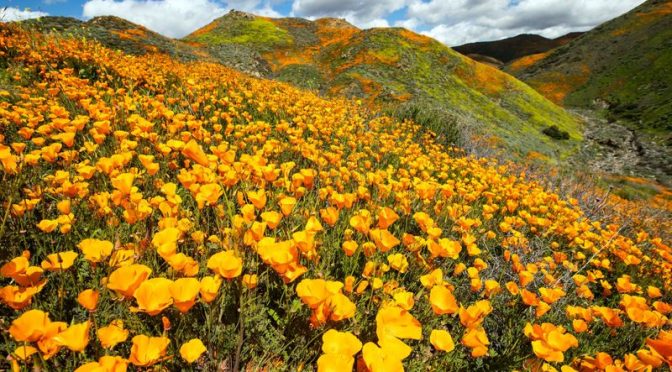In the hills of Lake Elsinore, children carried drooping apricot-colored poppies while panting dogs ran alongside them, their paws tainted orange.
Girls braided flowers into their hair and nature photographers juggled tripods and cameras, waiting for the lighting to be just right in Walker Canyon.
Throngs of visitors are trooping to the fields in Riverside County and elsewhere as Southern California revels in a super bloom of wildflowers, thanks to an unusually wet winter.
“It’s better than going to Disneyland,” said Randy Solis, a patrol officer with the Riverside County Habitat Conservation Agency, who was stationed at a trailhead Saturday in the Temescal Mountains, where the hills were carpeted in Day-Glo orange poppies.
But with all of the crowds, some flowers are paying the price. Blooms are being trampled, despite efforts by park rangers to keep people on trails and walkways.
“Look at those people. They’re stepping all over the poppies,” Solis said. “The people are nice — except when they’re fighting about poppies.”
In Lake Elsinore, the rolling green hills, splashed with touches of bright orange and purple, were interrupted by moving dark specks — people veering off the paths to find the perfect patch of poppies to pose for a photograph. And many came down the trail with bright-orange souvenirs, plucking the flowers from their beds.
The only enforcement were the visitors themselves, who sometimes scowled at people stepping on or plucking the flowers. One young woman walking past a pair of photographers loudly commented on the poor positioning of their tripods, edged right on top of the poppies.
Poppies bloom on the slopes of Walker Canyon near Lake Elsinore. (Etienne Laurent / EPA/Rex/Shutterstock)1 / 14
Southern California last experienced such a super bloom in 2017. The eruption of flora was the largest in more than a decade after years of punishing drought.
Great blooms are the natural product of a wet year following a bad drought — and that’s what’s happening now, said Richard Minnich, a professor in UC Riverside’s earth and planetary sciences department.
Sightseers have been anticipating this year’s flowers, wondering whether they would be as exceptional as those from two years ago.
Sang Han came to Lake Elsinore this week with his brother, Mathew Kim, to photograph the super bloom.
The 69-year-old Han seemed oblivious of his faux pas — or his neighbors’ disdain — as he scooted his tripod across a clump of orange flowers. He and Kim, 58, were waiting for passing clouds to let in a ray of sunshine and bathe the hillside flowers in light.
The two men follow the blooms every year, Han said, checking wildflower websites to learn when and where the blooms will be best.
“This is the hill,” Kim said after shuffling to his camera. “It’s beautiful.”
It was their second day at Lake Elsinore in a week, and the brothers were planning a new trek to Carrizo Plain National Monument.
“That’s going to be prettier than here,” Han said, every so often pointing toward the mountains and motioning for his brother — who was honing his photography skills — to get the shot.Super bloom comes to Carrizo Plain, wildflowers pop in Griffith Park and on Catalina »
Graciela Fonseca said she didn’t know about the blooms in Walker Canyon until her daughter saw photos of the flowers on Instagram and urged the family to make the trip from San Marcos.
Standing on the edge of a trail and watching her daughter pose for a picture among the poppies, Fonseca said she wasn’t expecting the crowds — or the hike.
“I’m not dressed for this,” she said. “But this is beautiful!”
Kim Cousins, president of the Lake Elsinore Chamber of Commerce, said about 1,000 people have been traveling each day to see the super bloom there.
The spectacular sight is creating a bit of a traffic nightmare around Walker Canyon, though.
An extra parking lot was opened, but even with the additional space, drivers can still anticipate a jam on the 15 Freeway, with cars backing up as much as 20 miles at times.
In 2017, frustrated drivers left their vehicles on the shoulder of the freeway to reach the blooms. This season has been no different as visitors descend on the flowered hillsides.
During the last super bloom, there were two-hour delays on nearby roads as more than 140,000 people visited Anza-Borrego Desert State Park, according to park official Dennis Stephen. Most headed to the visitors center, overwhelming staff. But this year, he said, rangers were making sure people know exactly where to go to see the flowers.
“Prior to 2017, there wasn’t the social media experience,” Stephen said. “We were not quite as prepared. We just want everyone to enjoy the flowers. To do so with large crowds always requires a lot of patience.”
Two years ago, the park reported several instances of visitors being overcome by the heat, and off-leash dogs — as well as humans — trampling the flowers.
This year, Anza-Borrego has placed booths throughout the park to assist visitors, including notices for guided hikes and tours.
November rains gave the blooms a head start, said Jim Dice, a reserve manager for UC Irvine’s Steele/Burnand Anza-Borrego Desert Research Center.
But unlike 2017, when the flowers blossomed all at once in one area, Stephen said, there’s no need to rush to take in the spectacle this year. This winter’s rains were scattered across different areas at different times, which means the blooms to the south will be around until April.
Officials at the Antelope Valley Poppy Reserve are also expecting a later bloom there.
But in Lake Elsinore, the poppies are already at their peak, decorating the hillside with splashes of color.
“I’ve seen it on the way, when I’ve driven by,” said Diane Bosma of San Diego, who recently stopped for the first time.
“From the freeway, you get a taste, but there’s so much more than that.”

